So you want to learn how to become a freelance writer. Welcome to the squad!
Problem is, you keep seeing things in freelance writing jobs descriptions like “SEO writing skills” or “keyword optimized.”
Maybe you have a fuzzy idea of what that means, or none whatsoever. Either way, you wound up here.
Good news, fam.
No more hoops to jump through.
No more ebooks or infographics filled with charts, graphs, and pages of “philosophical” SEO that no one understands.
You’ve finally found the down-to-earth, practical SEO guide that you’ve been searching for, and it’s as chock-full of writing tips and tricks you can actually use as you hoped.
You’ll walk away from this guide with the knowledge and skillset to help you:
That said, this is not an in-depth guide to SEO. That would require a book.
But if you’re interested in going deep on any one particular topic like title creation or keyword optimization, we’ll tell you where to go at the end of this guide.
What’s important here is to give anyone looking for information on how to be a freelance writer, or those a couple years into their careers trying to figure out how to write better with SEO in mind, a resource that helps them develop and emphasize the SEO skills that employers are looking for.
In this guide, you’ll learn:
Read it, learn it, save it, share it, refer back to it often.
First, let’s make sure we’re on the same page about what SEO is and what you need to know to be competitive in today’s freelance marketplace.
You’ve probably seen this header in every blog post or ebook you’ve downloaded on the topic of SEO by now, right?
So, I’ll make it brief.
(I’ll also explain what matters for anyone looking into how to start freelance writing).
SEO stands for Search Engine Optimization.
It’s a big umbrella term that covers a lot of concepts, but it all boils down to the tactics people use to optimize their website content in order to rank higher in Google search results which drives more traffic back to the site.
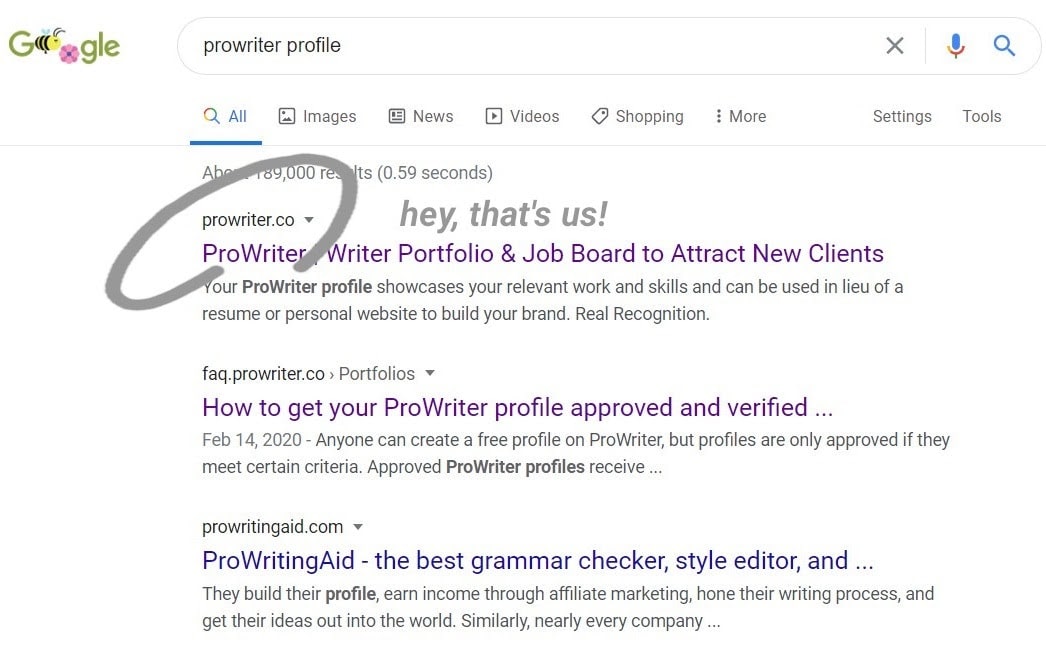
The goal of SEO is to appear on page 1 of a Google search for whatever content you’re trying to publish online (your website generally, individual blog posts specifically).
Let’s say you own a cupcake company in Atlanta, Georgia called “Yum Yum Cupcakes.”
You want someone searching “where can I find good cupcakes in Atlanta?” to see your website on the first page, and as close to the top as possible. Why? For two reasons…
One, because research shows that 31 percent of Google searchers click on the very first search result, 14 percent on the second, and 10 percent on the third.
This means only half of searchers even make it past the top three results!
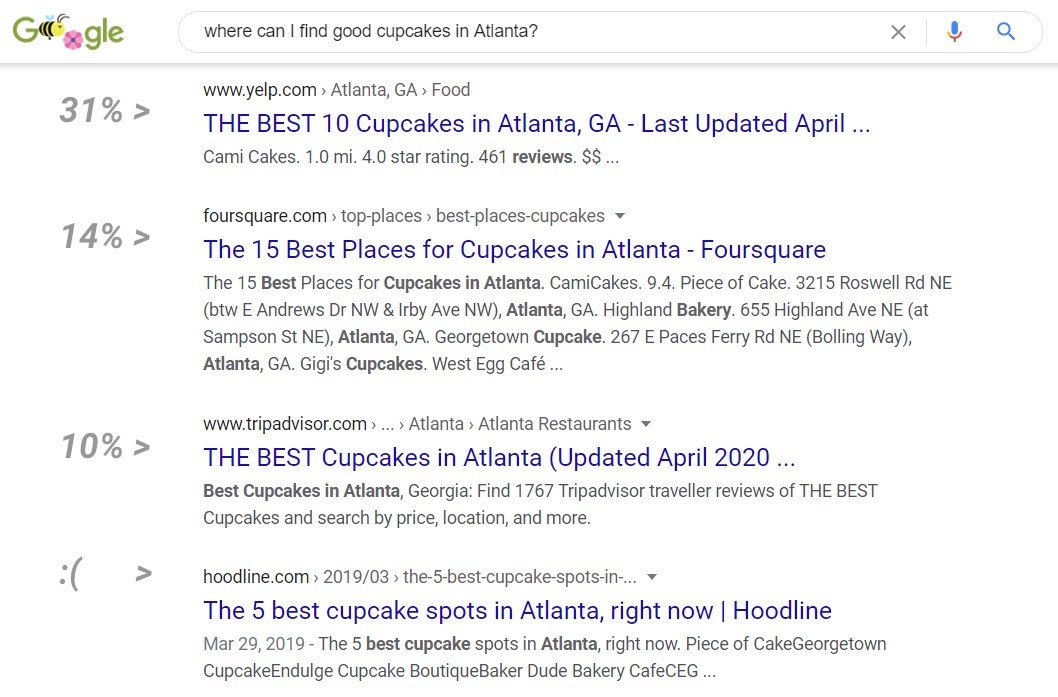
Second, you have competitors, and they’re trying to rank their website and content for the same search term.
When somebody is searching for cupcakes in Atlanta, you want them to find you and not your competitor, so you better outrank them.
And page two of Google search results?
You might as well be on page 100 seeing as less than 5 percent of searchers ever make it to the second page of results.
There’s a reason SEO pros joke that the second page of Google is the best place to hide a dead body.
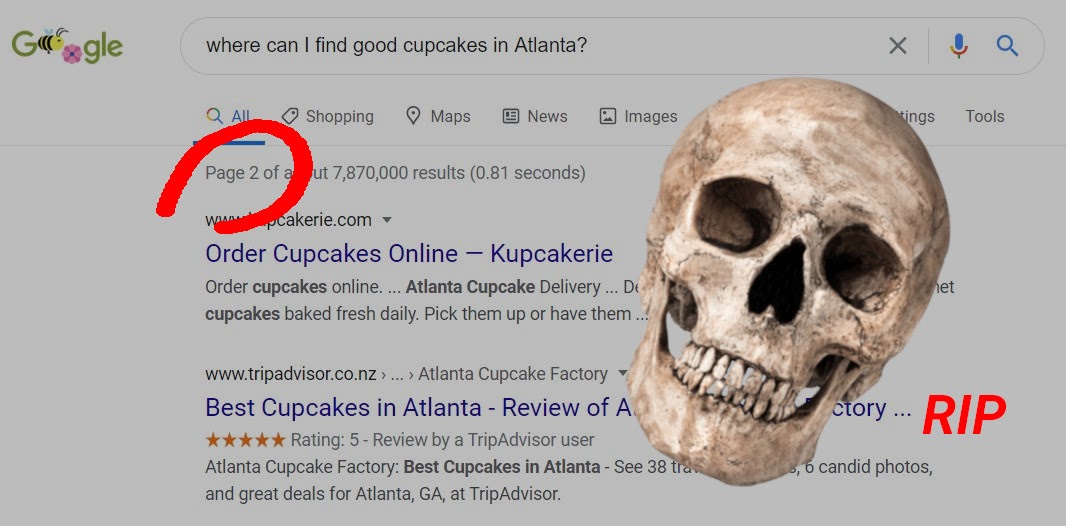
It’s a simple truth — being a top search result on Google = big wins for your business.
SEO is how you accomplish that.
When you talk to clients about SEO, you might hear them express a wish to produce “viral” content.
This means that they want to create extremely engaging content that creates a huge burst of traffic to their website right away.
Who doesn’t want that, right?
Most of this advice is 💩
While generating a ton of traffic in bursts of activity does sound like it should be what you’re after, most content never goes viral.
That doesn’t mean it’s not good content, or that it’s a “failure.” You need to ask yourself, and your clients, what your goal is.
Unless your client is a journalistic or entertainment publication that monetizes traffic and needs a constant drip of content based on breaking topics or evergreen trends, going viral is just the wrong goal.
While strategies and tactics for “going viral” do exist (some being more effective than others), the goal of an SEO writer is a content marketing goal.
It’s just two steps, and is really simple to remember. We call it the SEO writer’s one-two punch for content success:
What you’re doing: Creating content relevant to your client’s industry that Google searchers will find useful.
Why: To drive lead generation and sales over time.
Viral content creates a big burst of interest within a short period of time. You want to create lots of content that brings consistent traffic over long periods of time. That’s what leads to sales.
Again, most content will never go viral, no matter how optimized or well put-together it is. Your clients want to (or should want to) invest in recurring traffic. If your SEO strategy is built around waiting for the next “big hit,” the only big hits you’ll see are to your client’s sales and your reputation.
Going viral doesn’t create sustainable traffic and growth over time. Ranking on Google does.
There are other ways to create big boosts of traffic all at once, like paid media. But we’ll cover that in a future guide.
But let’s spend some time highlighting the difference between paid and earned media so we can drill down closer to our goal with SEO writing.
Another important piece of knowledge to add to your SEO toolkit is the difference between earned and paid results. Understanding this is key to talking the talk with your clients.
Ranking on Google is about unpaid or earned results. The highest level of success you can achieve in the ranking game is position #1 at the top of Google results.
Now let’s say you have a client that creates easy-to-use video editing software, and you want to try and compete for the keyword “video editing.”
So you write an exhaustive “Ultimate Guide to Video Editing” article with graphics and videos and fresh insights and by every objective measure, it’s the best piece of content about video editing on the web.
A few days after publishing, you Google “video editing” to see if it made it to position #1, but instead you see this:
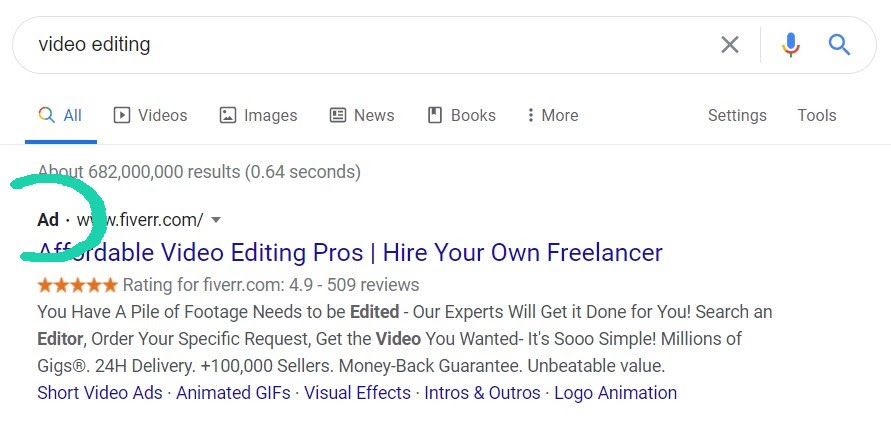
You’ve been Fiverr’d.
Why did this happen?
We said that the highest rank a piece of “earned media” can achieve in Google is position #1. But there is also a position #0. In fact, there are sometimes 3-5 items that might show up in position #0 before you see position #1.
Several of these items could be ads, like the example above. The good news is that anyone, including your client, can cinch this spot — provided they have the ad budget to compete with Fiverr for “video editing.”
The point is, the easiest way to appear in position #0 is by paying Google to be there. And it costs your client money every time somebody either sees or clicks on that result.
That style of marketing is called Search Engine Marketing (SEM) and that’s something completely different than Search Engine Optimization (SEO).
SEM = Pay to be on search results with ads.
SEO = Earn your way onto search results with relevant content.
For our purposes today, we’re staying out of SEM and talking about SEO, or earned eyeballs.
These are the people who clicked on your website because you showed up first in Google search results underneath the ads, in position #1.
Just so you know, there are other things that might show up in position #0. They include results from Google’s Knowledge Graph:
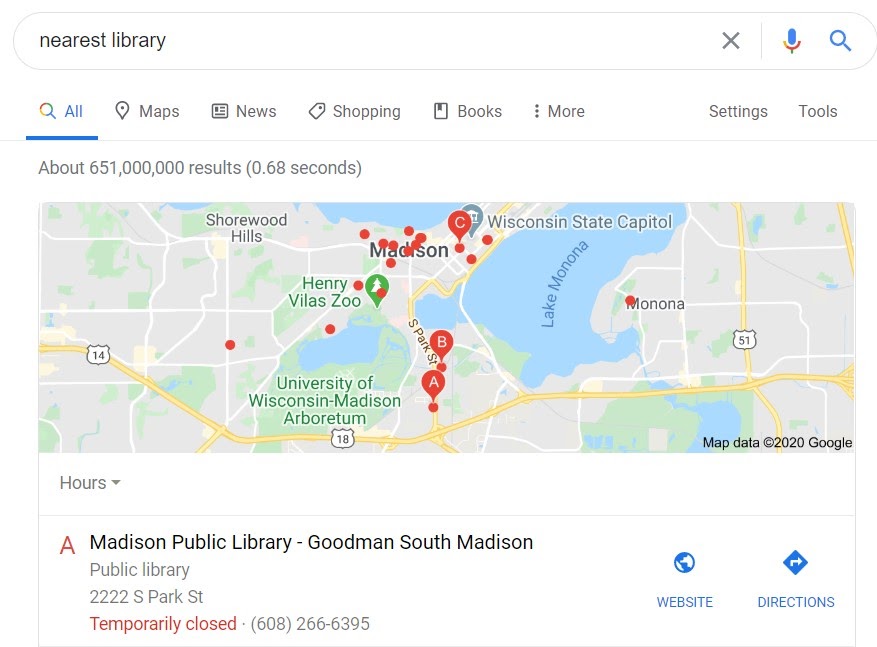
Typically, this is going to be a location-based result or some other definitive answer Google can provide from the Knowledge Graph.
You won’t be able to sneak above this one no matter what you do. You might also see something called a Google Snippet:
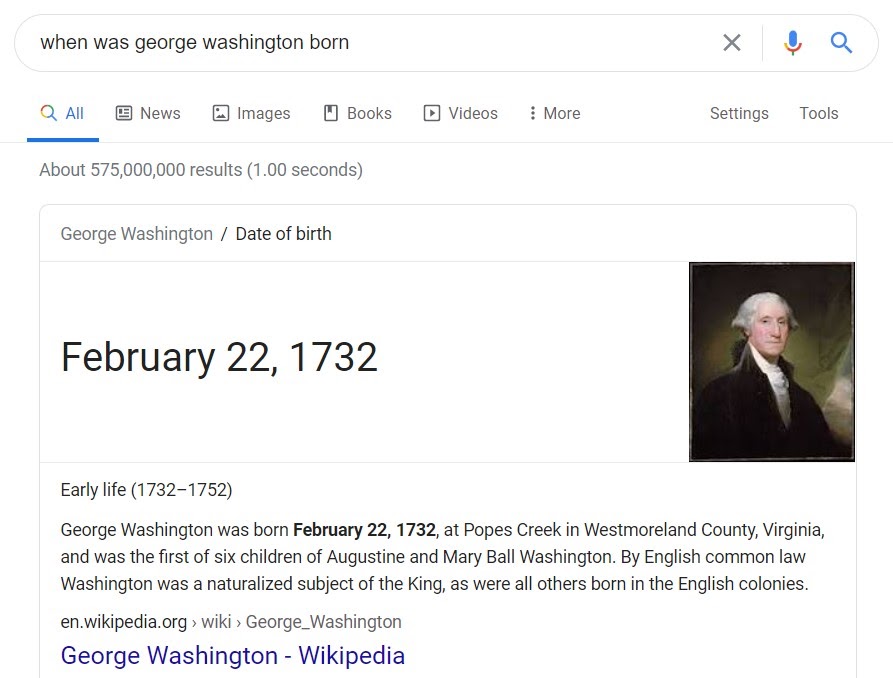
This is a unique Google feature that pulls an “excerpt” of an article on the web in an attempt to instantly answer a search query for a Google user.
Once you see it, you only need to click on the article if you actually want to know more. In other words, it’s a preview of the article that Google has decided best answers the user’s question.
The good news is that these are competitive, so you can earn a placement here with good SEO-optimized content.
But I’ll let you in on a little secret:
You’re never going to outrank Wikipedia.
Your ability to grab a Google Snippet is either a matter of finding a keyword or search query that doesn’t have a Snippet yet, or having a higher domain authority (i.e., more backlinks, indicating a more trusted site) than the current Snippet holder.
For the most part, don’t worry about it for now, unless you start offering strategic SEO consultation in the future.
So, TL;DR, don’t worry about SEM or position #0 for now. Worry about position #1.
So how do you get there?
Better yet, what do you need to know as a professional writer to help your clients get there?
Now, you’ve probably already done some reading on the SEO basics and are feeling pretty overwhelmed.
The learning curve can be pretty steep, because Google doesn’t publish an “SEO bible” containing all of the black and white rules.

Most of the good, legitimate advice you see is based on a lot of experimentation to figure out what seems to work over time.
SEO changes, too. So there’s a lot of bad or outdated advice out there muddying the waters.
Some SEO “experts” act like figuring out how to rank on Google requires a Herculean intellect capable of figuring out new ways to outsmart Google every day.
If you haven’t been at it this whole time and aren’t constantly keeping your finger on the pulse of it, you might as well just give up and hire them instead.
Oh look, more 💩
Don’t worry. You are not dumb.
Also, you are not so hopelessly behind that you can never catch up.
Hear it from me: It’s not you. It’s 100% them.
SEO is an industry. Want to get a taste for how big that industry is? Go search “SEO jobs.”
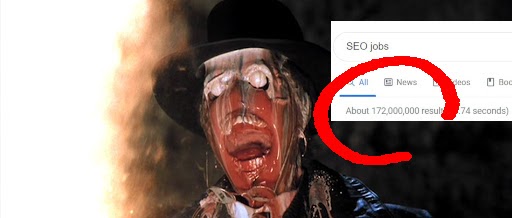
Major companies hire entire teams of highly-paid SEO consultants and full time employees who specialize in just one corner of the SEO sandbox, like link building or web page optimization.
Let’s nip it right there. You don’t need to know all of that stuff.
In fact, there’s a lot of SEO you do not need to know at all. At least while starting out.
Sure, the more you know, the more of those SEO jobs you can take on, the more money you can make in your career, yadda yadda.
There’s no magic to it, no secret “hacks”, and whatever intellectual software you’re working with, it’s more than enough, I promise.
Because once you understand what Google’s goal is as a business, you realize good SEO really comes down to just a few important things.
Let’s just focus on that stuff — the part of the SEO sandbox that you’re expected to know as a writer.
As a writer, your goal is to write good content. I bet you have that part taken care of.
What we want to help you do is start thinking about writing good content with SEO in mind from the get-go.
If you start using the SEO writing tips we’re gonna teach you here, your goal changes somewhat.
You still want to write good content, but you also want to optimize that content so that it has a better chance of helping your client show up toward the top of those Google search results.
According to Google, they favor pages that are unique, compelling, and high quality.
I know, I know. Here’s you right now:

But what exactly does Google mean by unique, compelling, and high quality?
How exactly do they decide that?
What are the exact criteria they use?
Well, we don’t know… … and they aren’t saying.
If this is you now…
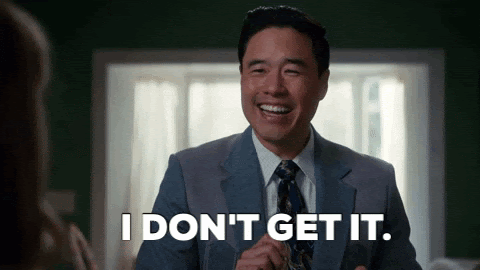
… don’t worry. We’re not trying to trick you.
Just because Google isn’t crystal clear about its criteria doesn’t mean we don’t know anything about what they want.
We do know that there are no ways to hack or game the Google algorithm. At least, not ways that will work for very long, and could ultimately get your clients in trouble.
Anyone who claims to have found a new SEO hack or secret has merely discovered a loophole that Google will close faster than you think.
Google’s algorithms grow more and more sophisticated by the day. They’re supported by an army of the world’s best data scientists and engineers who are all working on one problem: Making sure Google can help you find exactly what you’re looking for within milliseconds.
That’s why when people ask us for SEO advice, we say…
Don’t worry about Google. Worry about the reader.
Good SEO is just good writing that readers love.
Sounds funny, doesn’t it?
But it’s true. Think about Google’s main objective as a business.
You help your clients by giving Google trustworthy, high-quality content that answers search queries.
That is what SEO is about for you, the writer. That is your focus
Now, that doesn’t mean you should just write your heart out and hope Google rewards your enthusiasm. There are still best practices you should follow. That’s what we’re going to show you.
But those best practices aren’t going to make up for bad style. Style is what we want to focus on.
The good news is that “style” isn’t some new science you have to learn. Style just refers to principles of good writing that apply here, and to any piece of writing you’ll touch in your career.
Heck, a lot of what makes good SEO writing is stuff you already learned back in school. Stuff you don’t realize you already know.
These are simple, tried-and-true tips for writing that create smooth copy that puts readers first.
When you put readers first, Google is happy, your client is happy, and you’re happy because you get more work.
Now, what does content that creates a good reading experience look like?
One of the best hints we’ve ever gotten about what Google likes to see came from their webmaster trends analyst John Mueller. We linked to his interview above, but we’ll go deep and explain what he said in the paragraphs below.
He said content that stands any chance of ranking needs to be “unique and compelling and of high quality.”
If we read into what he’s saying a little bit more, we can add authoritative and relevant as well.
Mueller says:
“Whether the search system considers a site to be authoritative will typically be query-dependent. For example, the search system can consider the site for the Centers for Disease Control, ‘cdc.gov,’ to be an authoritative site for the query ‘cdc mosquito stop bites,’ but may not consider the same site to be authoritative for the query ‘restaurant recommendations.’”
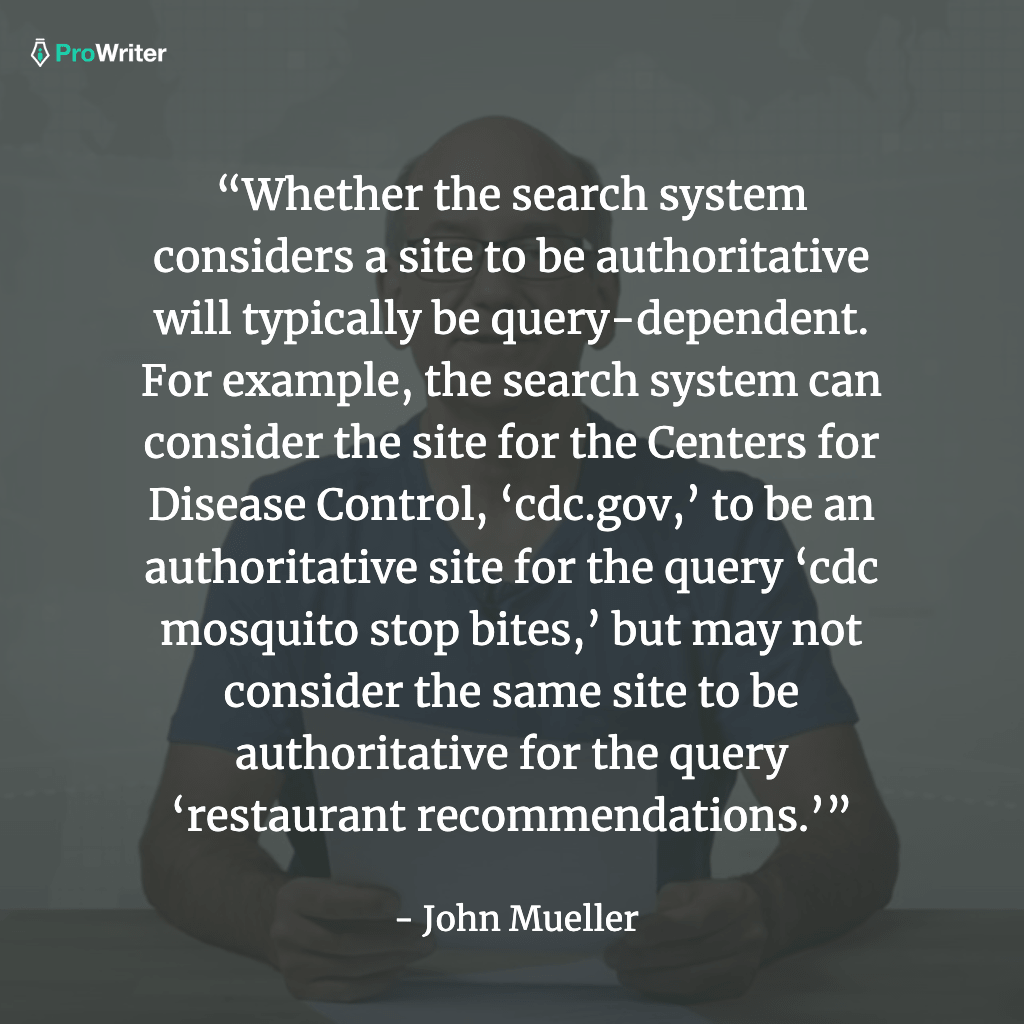
This means Yum Yum Cupcakes will rank highly as a bakery based in Atlanta, but not in Baltimore. Or, it will rank highly in Atlanta, but not for the search term “sports equipment.”
That’s because Yum Yum Cupcakes, as a cupcake bakery located in Atlanta, gets automatic authority to be talking about cupcakes in Atlanta. And you, as the writer, should lean into that.
How? Publishing content that is relevant.
Mueller continues:
“So instead of trying to work back how Google’s algorithms might be working, I would recommend trying to figure out what your users are actually thinking and doing things like user studies, inviting a bunch of people to your office or virtually to show them something new that you’re providing on your website and ask them really hard questions where sometimes the answer might be we don’t like your website or we were confused by your website or we don’t like the color of your logo or something. But kind of this is the hard feedback that’s really important to get and a lot of times these are things that you might not agree with but if all of your users are saying this then maybe that’s something you need to consider as well.”

Now, a lot of this user feedback stuff is not something you will be able to provide as the writer.
You might be able to inspire your client to do some customer surveys or give you feedback they’ve gotten over time to get a conversation going about what kinds of content you should be writing.
Let’s say Yum Yum Cupcakes keeps getting requests for certain recipes from happy clients. If people keep asking, it stands to reason other people might be interested, right?
Sounds like the makings of a good blog post to me.
Are you beginning to see how this works?
To rank in Google, your writing needs to be:
Once again, our job as writers is to not worry about Google, but to worry about the reader.
(And we have Google’s permission to do just that.)
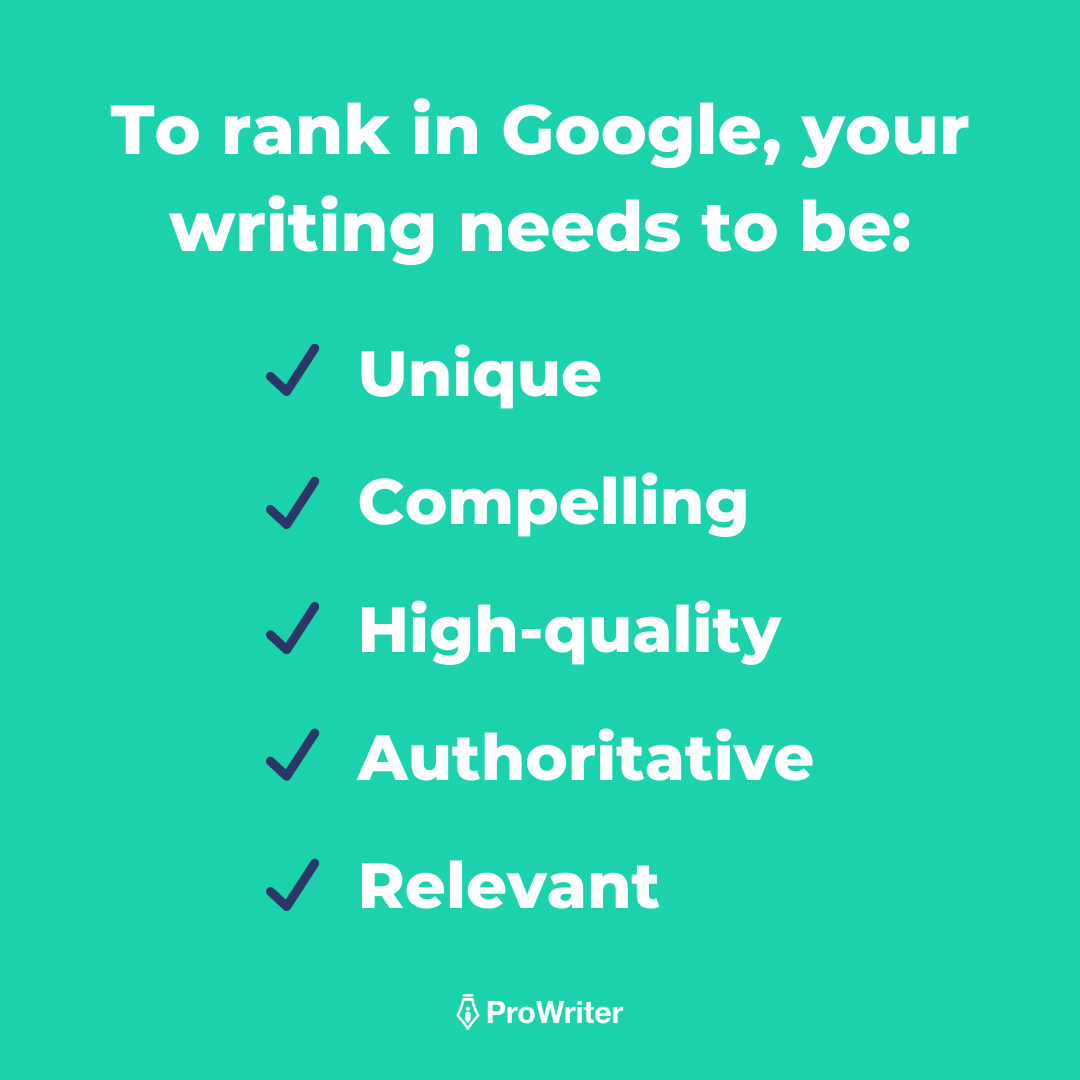
Now, how do we do that?
By writing content that emphasizes these 5 principles.
I find this one is really tough for new writers.
After all, you’re new to this kind of work, even if you’re already a good writer.
What can you say that’s fresh and original? That hasn’t been said before?
Well, the good news is you don’t need to put that kind of pressure on yourself, because that’s not what makes writing “unique.”
PRO TIP: Shorter sentences using everyday language will increase the “readability” of your copy.
What makes writing unique is an organic combination of good research, subject matter originality, and fresh insight.
Believe it or not, you have total control over all three.
Think about how you were taught to write research papers in school. You started with a thesis statement; a goal about what the paper is going to be about, and a proposition you set out to prove.
Let’s say your goal was “I want to write about tigers.” Your proposition was that “tigers are the best hunters in the big cat family.”
So, you probably did the following:
Unique writing is the same thing. Let’s say Yum Yum Cupcakes wants an article about the best cupcakes for Valentine’s Day.
The goal is to write about Valentine’s Day cupcakes and the proposition is that the cupcakes you’re including are the best ones according to Yum Yum Cupcakes.
Now what? Well, you don’t have to make up recipes for cupcakes, or go eat a bunch of them (though it’d be fun).
PRO TIP: Write for a general audience, even (maybe, especially) if you’re writing on a complicated topic or within a convoluted industry. Always break complex concepts down into simple ideas. Assume your reader is not a subject matter expert.
The major thing to avoid here is this:
DO NOT rewrite other articles or their outlines.
Treat it like plagiarism, because it is, even if it’s in your own words. You can pull data from other articles (and give credit where it is due), and you may be called upon to write articles on a same or similar topic to another site, but you must never ever rewrite someone else’s work.
It can hurt your client and get you fired (and you’ll deserve it).
What makes good writing interesting, or fun to read?
Think back to those research paper skills!
A lot of it has to do with how the piece is organized, and that means you’re going to have to put some thought into an outline.
Now listen to me, because this is important:
DO NOT SKIP THIS STEP.
I see so many overconfident writers give the outlining step short shrift because they think if they just jump in and start writing they will figure it out as they go and that will save time.
That couldn’t be further from the truth.
Writing without an outline increases your chances of:
I know it seems like more work, but you have to start with an outline. Doing so will actually make the writing stage faster and easier and makes your final review that much quicker.
An outline helps you work smarter, not harder.
PRO TIP: Make sure your outline is organized around a goal. What one thing are you trying to prove, argue, or inform about, and how are you going to do it?
An outline also makes your writing more compelling because it forces you to:
Compelling writing is also about a good hook.
Remember your research paper skills: your hook is the proposition. The thing you set out to prove, or your thesis statement. The unique thing you want to say about this topic to add to the big discussion.
In a blog post, your hook is your own (or your client’s) unique take on a particular subject. The theme of the piece. What makes this article different, and worth reading. An insight no one has had before.
Just like a research paper, you might establish this with:
There are other things you can do to make content more compelling, but they start to bleed into our next principle, so let’s just skip ahead, shall we?
There are hundreds, maybe thousands, of freelance writers out there who turn in sub-par copy.
Do NOT be one of them. If you are, you’re not going to make it.
Every piece of copy you give to a client needs to be publish-ready.
That means:
If you can’t do that, then you need to identify whatever gaps you have and close them quickly.
PRO TIP: Shoot for a 9th grade reading level, or a Flesch-Kincaid score of 70% or higher. You can start a WordPress account for free and install the Yoast plugin to score your copy.
A lot of writers send in incomplete drafts on the assumption there’s some other editor (or, insultingly, their own client) who will fix their misspellings and comma splices and rewrite the copy to their satisfaction.
There is no such person. You are the writer here. You are that expert.
Those are just the basics of what it means to be high-quality. If you can’t nail those, you’re way behind. Because there’s a lot more to delivering a high-quality piece of copy than grammar and mechanics.
Achieving “high quality” is a much more delicate matter that involves advanced concepts like:
Okay, check. Now let’s say you turn in a piece of copy with flawless grammar, mechanics, and spelling, and all of the advanced settings like good sentence structure, effective transitions, and a great readability score.
Now have we achieved high quality?
STILL NO.

I know. Bear with me.
High quality is also about formatting, or the presentation of the piece.
Imagine going to a 5-star restaurant and being served a sloppy joe on a paper plate. It might be the best sloppy joe you’ve ever had, but it’s a sloppy joe on a paper plate.
Presentation is ihuge.
Formatting touches to nail the presentation will include making sure your paragraphs are broken up, and that big chunks of text are separated with headers that re-engage the reader and summarize key points.
PRO TIP: Use short paragraphs. You want the copy to be “scannable,” so think of your chunks of content in terms of “lines.” You don’t want paragraphs bigger than 3 lines tops if you can help it.
If you really want those extra credit points, pull out a good line from your copy and make it a blockquote somewhere else in the piece, so that it stands out visually.
You can also add media, like images, social media posts, or even videos, depending on what’s available and what your client is into..
A good general practice is to break up chunks of copy every 200 words or so.
You can do that with some mix of headers, blockquotes, and media, just make sure there’s enough variety that the overall presentation is attractive.
Now we’re in the inner circle of what “high-quality” means.
I know, I know; these 5 principles can feel like moving targets.
But this is one that, as the writer, you should be able to guarantee your client when you come to the table.
Every. Time.
If they have to spend time rewriting your copy, you need to find another vocation, plain and simple.
Of the 5 principles, this is a toughie, even for professional writers.
There’s a lot of advice out there about new writers finding a “freelance writing niche” and becoming “experts” before they can command the high-payout jobs.
This might not be bad advice on the whole, but I think the argument is a bit misleading.
Getting a professional degree and years of experience contributing in a particular field might make you a subject matter expert, but that experience doesn’t automatically make you good at writing about that industry.
Don’t let anyone get away with diminishing this: Writing well is its own professional skillset, independent of niche and industry. You should focus on becoming an expert communicator, and finding new ways to improve on that skillset first and foremost.
We’re not knocking subject matter knowledge. Of course it’s good to find an industry or two that you know a lot about to look for work in. Writing is easier on familiar topics, and you can probably attract more clients in those industries.
But you don’t have to be an industry expert to write in it.
You’re a writer. You’re an expert on writing.
PRO TIP: Keep passive voice to a minimum. It’s bad style, and unnecessarily hard to read.
So how do you close the industry knowledge gap?
Starting out, it will mean more research. More time spent in the places where your clients learn new things, and knowing to ask better questions of your clients and what they do.
Being good at research is part of your skillset. But breaking down complex ideas into pieces of copy that are easy to understand and enjoyable to read is the extra special thing you bring to the table. That’s the unique skillset you have that your clients don’t.
You clients are the subject matter experts. No amount of research will make you as much of an expert on baking as the owner of Yum Yum Cupcakes.
They dedicated their lives to cupcakes. You dedicated yours to writing.
What does all this have to do with authority?
Plain and simple — when it comes to selling yourself to a potential client, sell your writing skills.
Do not sell yourself as an expert unless you actually are one, through education, certification, or industry experience.
Sure, you might want to avoid writing in industries that are completely foreign to you. I cannot write about tech or sports, so I don’t.
Avoid the pressure to “be an expert.” If you feel like you need to exaggerate what you can do to get a job, then you’re being dishonest and hurting yourself and your client.
Be patient. Once you build up your portfolio, you’ll be able to tell prospective clients that you have a lot of experience writing in their industry, and that will be a plus.
But don’t sell yourself as something you’re not.
Your client is the expert.
You’re the expert in helping them tell their story.
That’s the thing you’re the expert on.
You’re going to have to get to know your client. Do some research on them, and their business. Do some research on their industry. Figure out some good questions to ask:
This is just for starters, but questions like these will start conversations that become blog post ideas and give you more ideas for questions you need to ask to really take on those blog writing jobs with authority.
PRO TIP: Make clear transitions between sentences and sections. This is what gives a piece of copy “flow.”
The point is, rely on your client for subject matter expertise. But you can’t ask them to do your job for you.
You have to ask the right questions to pull that information out of them so that you can use that information in your writing to help your client establish authority online.
What you’re trying to do is help your client look like a boss in their industry.
If others in the industry are linking to or sharing the content you’re writing for your client, then that’s the clearest sign that it’s working.
Someone out there is searching for information only your client and their competitors can provide.
Your job is to send up the right flares so that they find you first.
At some point, you might wind up with a gig where your client is also paying you to help them with content strategy; they’ll look to you to come up with topic ideas and give advice on what keywords to target for their industry.
Those are primo paying gigs. But, content strategy is a little more advanced, so maybe we’ll cover that in a future article.
Right now we’re assuming that your clients already have a good idea of the topics they want to write about and the keywords they want to target.
Your job is just to write highly-optimized copy following these 5 principles so that searchers find your client first.
The final principle is about what’s relevant.
PRO TIP: Do not “word stuff” to meet an arbitrary length goal. Always cut unnecessary words for readability’s sake. You can (usually) start with adverbs. See?
Relevance isn’t about what the kids are talking about these days or what’s trending on TikTok.
Relevance is about having the best answer to the question being asked.
If you ask Google something like “where is South Dakota,” you’ll notice you’ll get something like this:
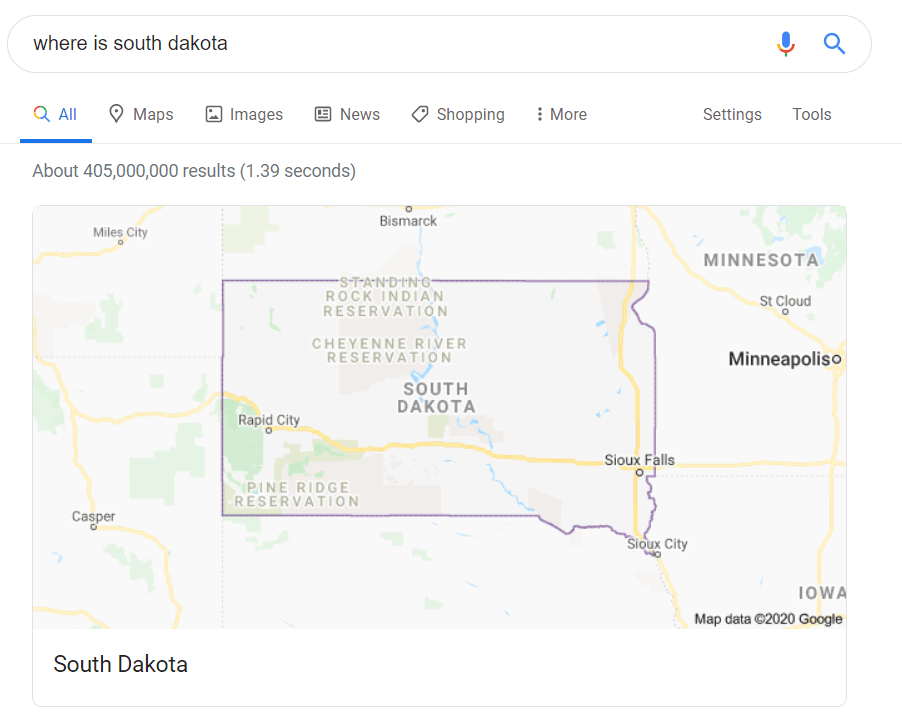
This is from Google’s Knowledge Graph. It’s here in position #0 because it’s pulled from Google Maps. It’s the best possible answer to the question “where is South Dakota” and in terms of Google search results, it ain’t going anywhere.
If you Google “best bakeries in Atlanta,” you will get results from Yelp, Eater, Tripadvisor, and others.
Guess what? Those are articles written by writers like you.
Google “best Valentine’s Day cupcakes” and you’ll see even more.
Again, figuring out which search queries to write content around and what keywords to optimize is complicated (it’s unlikely a small bakery’s blog is going to outrank Yelp).
But the point is, once your client (or you, if you’re providing content strategy) decide what those queries are, you as the writer need to create content that provides the best possible answer to the search query.
That’s relevance.
It’s important to note that not every blog post will be a slam dunk. Like we’ve said, even if everyone you ask agrees that your post on a particular topic is the best answer to the question, it still might get ignored by Google.
That’s because good SEO is a complex mix of these 5 principles. Websites build domain authority over time with more compelling, high-quality, relevant content. SEO is about pressure over time.
That’s where you come in.
As a writer, the important thing to focus on is answering search queries as fully and satisfyingly as possible, while also making sure the content reflects these 5 principles.
All 5 together are a recipe for SEO success that puts the reader and their search experience first.
What Google wants is for you to give readers what they want.
No copy that violates these principles will be able to accomplish that.
I know that was probably a lot to take in. You might want to read this again a few times, take some notes, print it up and make some highlights, and refer back to it often.
But if you can wrap your head around all of this, you will be a highly-proficient and competitive freelance writer.
Heck, you’ll be ahead of the curve. I have reviewed thousands of writer applications and can say that even among the top 5% only a couple have one or two of these principles nailed.
Freelance writing is competitive. But good freelance writers that can actually deliver are rare.
This guide will help you on your path to becoming one of them.
Sign up right now and get full, immediate access to ProWriter’s library of resources and marketing tools. Heck, you might even land your first paying client today!
